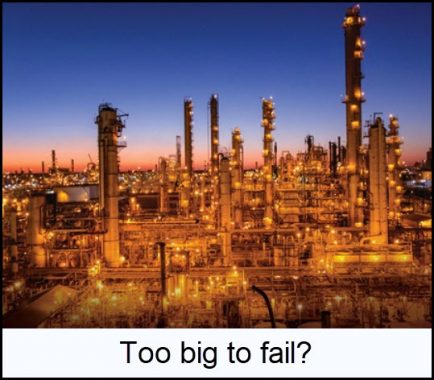 With the whole world rubbernecking at the scene of crude oil’s crackup, you could lose sight of why it matters. Listening to Trump fret about it tells us nothing. He has endorsed collusion by energy suppliers, the better to push prices back up to…whatever. But he hasn’t said why this would be a good thing. It’s not as though we’re all feeling sorry for the likes of Exxon and BP just because the value of their inventory has imploded. Unfortunately, the benighted hacks who invent the news are too lazy to give us the real story. They’ve never been able to explain, even, why the price of gasoline sometimes fluctuates violently over a range of $1.00 or more, or why natural gas prices can crash without reducing our heating bills by a dime.
With the whole world rubbernecking at the scene of crude oil’s crackup, you could lose sight of why it matters. Listening to Trump fret about it tells us nothing. He has endorsed collusion by energy suppliers, the better to push prices back up to…whatever. But he hasn’t said why this would be a good thing. It’s not as though we’re all feeling sorry for the likes of Exxon and BP just because the value of their inventory has imploded. Unfortunately, the benighted hacks who invent the news are too lazy to give us the real story. They’ve never been able to explain, even, why the price of gasoline sometimes fluctuates violently over a range of $1.00 or more, or why natural gas prices can crash without reducing our heating bills by a dime.
Paper Shufflers Rule!
Anyway, in case you missed an earlier commentary published here, crude-oil assets are the very real collateral for much of the aggressively leveraged borrowing that has taken place in global financial markets. The $1.5 quadrillion dollar derivatives market, for example. Just what percentage of this excrescence was seeded by oil in the ground is open to speculation. Suffice it to say, its dollar value would likely dwarf the approximately $100 trillion value of goods and services produced on this planet. So why do we need a financial edifice that is more than ten times the transaction value of actual things? The simple answer is that the main business of these times is not making things or performing tasks for a fee, but shuffling paper. Mostly, this shell game comprises hyperleveraged financial instruments whose relationship to the collateral from which they’ve sprung is as inscrutable as string theory.
So there you have it: The collapse of oil prices matters because, along with real estate, energy assets underpin most of the world’s debt. Receivables are just a rounding error. The Fed may be able to pump out enough funny money to keep the Dow from falling straightaway to 5000. But prevent a global debt bubble with a notional value 50 times the size of the U.S. stock market from collapsing? No way.

I never could quite understand why the 600 Trillion Dollar Derivatives Market is such an existential threat to anyone other than the guys at GS, JPM, DB etc. that paid 5 cents for an option and now think they absolutely must be paid the $1000 an option the trade is now “Worth.”
If the counter party does not have the money to pay off that “Bet” shouldn’t they just declare bankruptcy?
And GS, JPM, DB, etc. get in line and maybe get back the 5 cents an option which is all the money they are really out. Or have a Court declare the trade “illegal gambling” and unenforceable under the law?
And if the counter party is a retail bank in the USA, the FDIC pays off the insured deposits, and the rest eat the loss.
And after the trillions created out of thin air, and just gifted to Wall Street, no one can say with a straight face that that can’t be done to save Main Street’s FDIC insured deposits, or Social Security for that matter!
The entire 600 Trillion Dollar Derivatives problem is just a MSM propaganda story ordered up by the member banks of the Federal Reserve.
And they will likely get away with it in the end, because the last guy to defeat them was Andrew Jackson!
&&&&&
The loss would be collectivized and sufficiently huge to wreck the global economy and financial system. You and I are bit players, but it would wreck us, too. I think you’ve overestimated the capabilities of the FDIC. It could bail out — just maybe — 1.5 banks in good times, but in a collapse it would be vaporized in under an hour, on its way to becoming a punchline for some wiseacre historian. RA